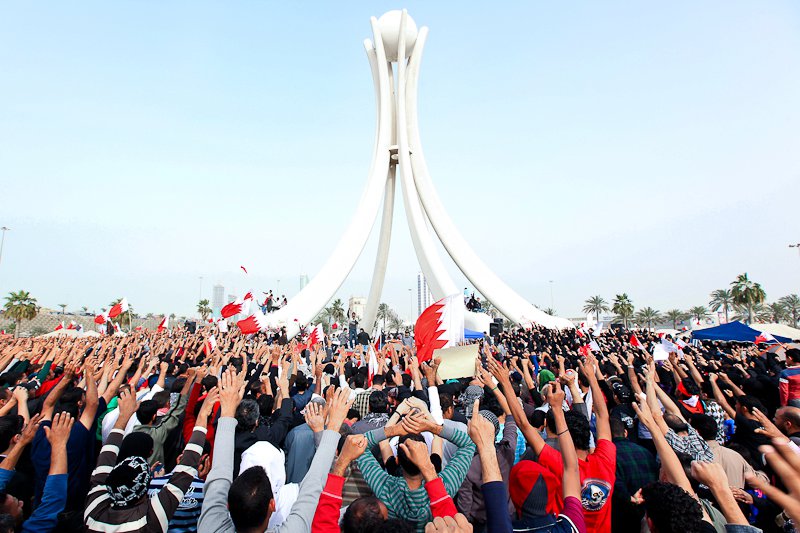During the 2011 uprising, Bahrain’s human rights abuses took center stage when security forces used excessive force against peaceful pro-democracy protests. Since then, evidence of human rights abuses by the government continues to mount. Although widespread documentation of the government’s use of torture, arbitrary detention, and flawed trials makes it difficult for Bahrain to cover up ongoing offenses, it repeatedly denies complicity in any wrongdoing. At the 30th Session of the UN Human Rights Council, however, 35 Member States sought to correct this narrative and expressed “serious concern” over the government’s lack of progress in a joint resolution. This was the fifth time that member states publicly addressed Bahrain’s lack of reform. Bahrain responded to the statement by claiming it has almost completely implemented all 26 recommendations from the Bahrain Independent Commission of Inquiry (BICI) that it publicly accepted in 2011. The government’s response to international criticism is yet another attempt by the government to cover up its ongoing human rights abuses; when reviewed further, the claims made in their response prove to be inaccurate.
In its response, the Bahraini government claims that international criticism is based on “misinformation and false accusations,” a phrase which has been on replay whenever new allegations of human rights abuses come to light. Numerous testimonies from unjustly imprisoned human rights activists belie such a claim. For example, Bahraini authorities arrested Nabeel Rajab for posting a tweet about the torture and ill-treatment of prisoners at Jau Prison and charged him with “insulting a statutory body.” Mr. Rajab’s case is just one of many: the government jailed most of the opposition’s leadership and other human rights defenders, like Abdulhadi al-Khawaja, in some cases imposing life sentences for peacefully calling for reform in 2011. Perhaps even more concerning than its widespread jailing of critical voices is the wide documentation of Bahrain’s abuse against children. Last month, the UN Special Procedure made public their concerns that Bahrain has arbitrarily arrested at least 39 minors and communicated allegations of their systematic abuse while in detention. Since the uprising in 2011, the government continues to face accusations of torturing its adult and child detainees alike.
While Bahrain has created some human rights protection mechanisms recommended by the BICI, the institutions remain deeply flawed and unable to carry out their mandate to protect the victims of human rights abuses. Institutions like the Ombudsman Office, the Bahrain National Institute of Human Rights and the Prisoners and Detainees Commission are influenced by the ministries which these institutions are meant to monitor, calling into question their impartiality and independence. Further, the judicial system does not provide adequate guarantees against arbitrary detention or arrest; rather than being independent, the judiciary and Supreme Council of Judges remain under the supervision of the Minister of Interior and King Hamad, respectively. Despite the promising implementation of these institutions mandated by the BICI, Bahrain continues to avoid signing an agreement of cooperation with OHCHR, which would allow for more oversight and accountability of these institutions. As in many other authoritarian governments, Bahrain’s “reforms,” as exemplified by these institutions’ establishment, are carefully calculated to give the pretense of progress without conceding any real power or accountability.
Other myths laid out in the Bahraini response to the joint statement are its claim that free expression and freedom of assembly are “constitutional rights” and that it only prosecutes individuals as a means to “to curtail incitement, hatred and sectarianism.” Since 2011, Bahrain has passed laws criminalizing dissent, banning protests, and limiting the freedom of expression. As recently as 2014, it expanded an anti-terrorism law allowing individuals to be held for 28 days before being charged. Bahrain justified this legislation as providing necessary mechanisms to protect the country from instability and terrorism. Rather than protecting the public, these laws protect the monarchy’s claim to power by criminalizing dissent and creating an environment of self-censorship, thereby making the public too afraid to dissent.
Bahrain’s assurances that institutional changes created real reform can not be taken at face value. Instead, the international community should continue to press the Government of Bahrain, both publicly and privately, to institute real reforms that remedy the systemic flaws in the country. It is time for Bahrain to stop using its power to bully its citizens into submission and accept that denying concrete evidence of human rights abuses cannot continue forever.
Shelby Jamerson is an advocacy intern at ADHRB.





